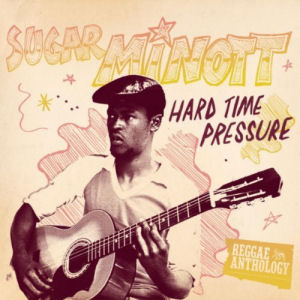Despite P. Diddy’s claims to the contrary, it was reggae musicians who truly invented the remix. Jamaican producers were repurposing instrumental backing tracks, or riddims, before Sean Combs was out of diapers. Dub producers took riddims in strange and exotic directions, and deejays chatted over riddims, often answering the original song. Sugar Minott pioneered the art of singing over riddims, creating new songs out of existing templates. This box set collects 36 of his songs and DVD of him playing live in Japan in 1986.
Sugar Minott got his start singing in the vocal group African Brothers. In the late seventies, he began writing and singing new songs over old Studio One and Treasure Island instrumentals. The producers and record companies loved him because he could create brand new tracks without having to hire musicians to record new music. He was so successful at it, he started his own Black Roots label.
Disc one starts off with his early hit “My Love Is True,” followed by “Hard Time Pressure,” a reworking of Hopeton Lewis’s “Sound and Pressure.” The two songs show two distinct sides of Minott’s personality. the romantic crooner and the protest singer. It’s a testament to his versatility that he was able to sing both types of songs convincingly. Disc one leans heavier on roots reggae concerns of praising Jah and the herb, and singing about injustice. Minott had a gift of making protest music sound as sweet as a love song. “Ghetto-Ology” is about life in the ghetto, but Minott sings it as if he were singing about his first kiss.
Disc two covers Minott’s 80s output, including his major hits “Buy at the Bar,” “Herbman Hustling,” and “Rub a Dub Sound.” I usually prefer 70s reggae to the more digitized 80s production, but with Minott in the mix, the songs from the 80s sound as good as the ones from the 70s. Dubbed the Godfather of Dancehall, Minott worked with many of the sparse, heavy riddims that top dancehall deejays like Yellowman and Eek-A-Mouse used. Minott’s delivery was much smoother and soulful than the yelping, barking style of most deejays.Songs like “Informer,” use dancehall riddims in the same way Mary J. Blige used hip-hop beats for her R&B songs, offering a perfect contrast between the hardness of the beats and the sweetness of the singing.
The two discs cover a lot of material, which makes this one of the most extensive collections of Minott’s music out there. After listening to this for the past week, I’m thinking I’ll need to pick up “Black Roots,” “Ghetto-Ology,” and perhaps a few more of his albums. The live disc shows Minott in all his glory singing “Slice of the Cake,” Herbman Hustling,” Nah Go to South Africa,” “The Love We Have,” and a medly that includes “Get Up, Stand Up,” and “Exodus.” The whole collection is a fitting tribute to a late, great reggae artist, and is highly recommended.

